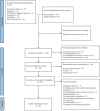Effectiveness of technological interventions on psychosocial well-being and perception of technological interventions among people with Parkinson's disease: A systematic review
- PMID: 40317851
- PMCID: PMC12048698
- DOI: 10.1111/ajag.70034
Effectiveness of technological interventions on psychosocial well-being and perception of technological interventions among people with Parkinson's disease: A systematic review
Abstract
Objectives: The increasing number of technological interventions related to Parkinson's disease (PD) signifies growing research interest in the PD technological domain. It remains unknown how these interventions could affect the psychosocial health of people with PD. This systematic review aims to explore how technological interventions affect people with PD psychosocial well-being and their perception towards these interventions.
Method: A systematic review was conducted using Cochrane Library®, Embase®, IEEE Xplore Digital Library®, PsycInfo®, PubMed® and Web of Science® databases following PRISMA guidelines. Two individual assessors conducted quality appraisals using the Mixed Method Appraisal Tool. Both quantitative narrative and qualitative thematic synthesis were adopted to analyse the extracted data.
Results: This review included 27 articles with 752 people with PD, with seven categories of technologies implemented in physical rehabilitation. Qualitative findings indicated the overarching theme of coping with technological intervention. Three themes were identified: user perception of intervention design and functional appropriateness, attitude shift and coping, and perceived benefits from technological interventions. Unsuccessful coping attempts and overcomplicated intervention designs induced negative emotions and affected the psychosocial well-being of people with PD.
Conclusions: Although most PD technological interventions focused on physical rehabilitation, people with PD reported a psychosocial gain in improved autonomy and reinforced social relationships during the intervention period. A better rewardability intervention design was considered more satisfying and could promote self-acceptance rather than stress-inducing. Interventions' technological complexity should match participants' expectations and technological literacy to facilitate the coping process with the intervention for people with PD. More research would be required to quantify the reported psychosocial gain and examine the technological literacy of people with PD when designing a more appropriate intervention regime.
Keywords: Parkinson's disease; digital health; psychological well‐being.
© 2025 The Author(s). Australasian Journal on Ageing published by John Wiley & Sons Australia, Ltd on behalf of AJA Inc.
Conflict of interest statement
No conflicts of interest declared.
Similar articles
-
Psychological interventions for people with hemophilia.Cochrane Database Syst Rev. 2020 Mar 18;3(3):CD010215. doi: 10.1002/14651858.CD010215.pub2. Cochrane Database Syst Rev. 2020. PMID: 32187661 Free PMC article.
-
Exploring public perceptions and awareness of Parkinson's disease: A scoping review.PLoS One. 2023 Sep 15;18(9):e0291357. doi: 10.1371/journal.pone.0291357. eCollection 2023. PLoS One. 2023. PMID: 37713383 Free PMC article.
-
Experiences of people with Parkinson's disease and their views on physical activity interventions: a qualitative systematic review.JBI Database System Rev Implement Rep. 2019 Apr;17(4):548-613. doi: 10.11124/JBISRIR-2017-003901. JBI Database System Rev Implement Rep. 2019. PMID: 30973527
-
Systematic review and meta-analysis of clinical effectiveness of self-management interventions in Parkinson's disease.BMC Geriatr. 2022 Jan 11;22(1):45. doi: 10.1186/s12877-021-02656-2. BMC Geriatr. 2022. PMID: 35016613 Free PMC article.
-
Promoting and supporting self-management for adults living in the community with physical chronic illness: A systematic review of the effectiveness and meaningfulness of the patient-practitioner encounter.JBI Libr Syst Rev. 2009;7(13):492-582. doi: 10.11124/01938924-200907130-00001. JBI Libr Syst Rev. 2009. PMID: 27819974
References
-
- Yang S, Sajatovic M, Walter BL. Psychosocial interventions for depression and anxiety in Parkinson's disease. J Geriatr Psychiatry Neurol. 2012;25(2):113‐121. - PubMed
-
- Soleimani MA, Negarandeh R, Bastani F, Greysen R. Disrupted social connectedness in people with Parkinson's disease. Br J Community Nurs. 2014;19(3):136‐141. - PubMed
-
- Nijhof G. Parkinson's disease as a problem of shame in public appearance. Sociol Health Illn. 1995;17(2):193‐205.
Publication types
MeSH terms
LinkOut - more resources
Full Text Sources
Medical


